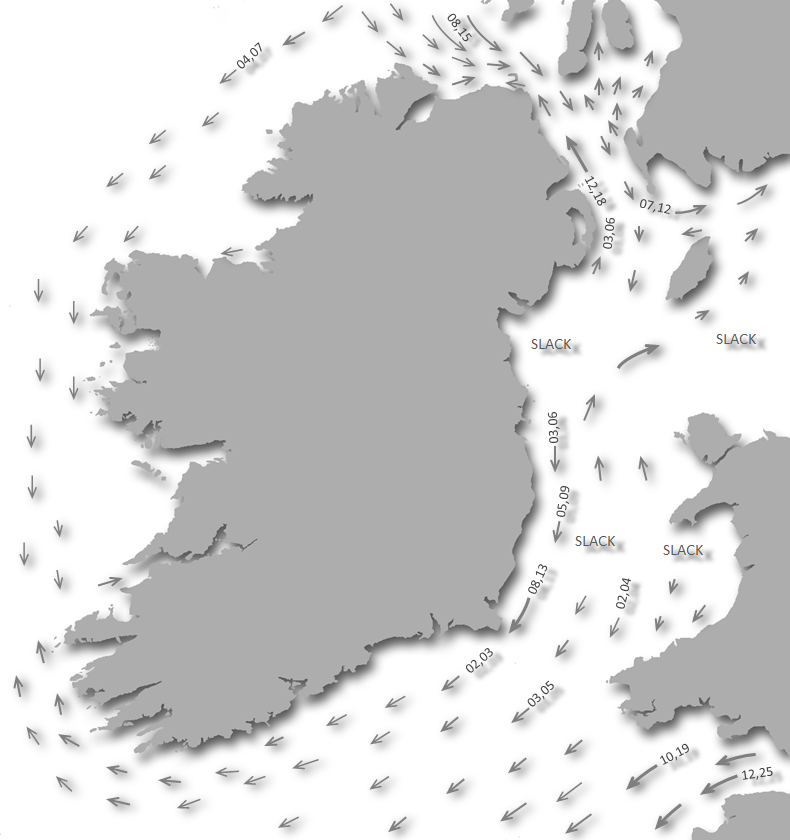- +Today's Tides for Foynes Harbour
- +Foynes Harbour's Future Tides
- +Weather for Foynes Harbour
- +Advanced Haven Search
- +Contacts and Emergency for Foynes Harbour
- +Local Navigation Resources

| High Water | Low Water |
|---|---|
| 00:54 (-0.1m) | 01:57 (-0.1m) |
| 13:19 (-0.1m) | 14:22 (-0.1m) |
| Now Rising |  |
| Time to high | 23:11 |
| Total rise | 0m |
| Remaining rise | |
| Tide height over CD |
| Mean Spring Curve | Mean Neap Curve | Intervening Period |

Small tidal stream inaccuracies can develop when advancing beyond HW Dover +6. Because of this we only enable today's tidal stream chartlets to advance 24 hours. Future tidal planning is best accomplished by using Foynes Harbour's future tides predictor below.
The above image represents the current tidal streams offshore of this haven. Streams attaining three knots and above are highlighted by red arrows
 . All times are in local time with red text indicating springs, blue indicating neaps and gray between tidal events. Click [+] to advance the estimate by an hour and click [-] to step back.
Future tidal planning is best accomplished by using Foynes Harbour's future tides predictor below.
. All times are in local time with red text indicating springs, blue indicating neaps and gray between tidal events. Click [+] to advance the estimate by an hour and click [-] to step back.
Future tidal planning is best accomplished by using Foynes Harbour's future tides predictor below.
Do you need more information on the tidal graphics?
Arrows represent the direction of tidal streams with lighter or shorter arrows indicating weaker streams. Stronger streams are indicated by heavier or longer arrows, and as mentioned above, red arrows flagging rates of 3 knots and above. Numerals represent [mean neap, mean spring] rates in tenths of a knot. For example the numbers 12,23 would indicate a mean neap of 1.2 knots and a mean spring of 2.3 knots.
More local tidal details
Today's Galway tides — High water: , Low water:Today's Dover tides — High waters: 12:22, 01:00, Low waters: 07:21, 19:34
We are now on Springs.
Also -0515 Dover, MHWS 5.2m MHWN 4.0m MLWN 1.8m MLWS 0.3m
Spring range 4.9, neap range 2.2
Shannon Entrance tides and mid channel spring rates
The flood (in going) stream starts at -0520 HW Galway (+0100 Dover) at 2.5kn
The ebb (outgoing) stream starts at HW Galway +0045 (-0515 Dover) at 4kn
Once inside stream rates vary at different points of the estuary. Off Tarbert Island, the flood begins about 5 hours before HW at Galway and the ebb about 1 hour after HW. A good simplification for a passage as far as Foynes is to take it that the flood starts approximately 5 hours before, and the ebb 1 hour after HW Galway. At Foynes the current runs through the harbour in line with the channel; the spring rate in each direction is 3kn.

This tool can be used to estimate future costal tidal streams for this area. All that is required are two simple steps:
Step 1: What is the Dover High Water for the target date?
Use a current Dover Tide Table to find Dover High Water for the target date. The National Oceanography Centre offers online tidal predictions for up to 28 days from today. Click here to open their tide table for Dover

Step 2: Input the target date's Dover High Water
Taking a mean tidal offset from Dover's tide, we expect your targetted date's associated local tide at to be:
High waters: Low waters:
Data based on an average tide is only accurate to within one hour, if you more precise times are required use the ISA tidal predictions, with Galway offset +01:50.
| Today's overview |
||||
 |
 |
 |
 |
 |
| °C °C |
°C °C |
°C °C |
°C °C |
°C °C |

Click [+] to advance by twelve hours and click [-] to step back. The forecasted time is presented in the top left hand corner of the pressure chart. Click the image to display it in a full window.
 Get today's Shipping Forecast for this Sea Area
Get today's Shipping Forecast for this Sea Area Get today's RTE Video Forecast
Get today's RTE Video Forecast Met Éireann Sea Area Forecast
Met Éireann Sea Area Forecast |  |  |
 |  |  |
| Set your current location | Set the maximum distance you are prepared to travel | Check off what you want |
Valentia Maritime Rescue Sub-Centre (MRSC) VHF Ch 24 & MF 1752 kHz covers this costal area. Cork (26), Mizen (04), Bantry Bay (23), Shannon (28) and Galway (04) provide relay stations. Coastguard Radio is always called on a working channel. Emergencies are worked on 16, 67 and working channel.
Alternatively, or if ashore, phone 999 or 112 (free) and ask for ‘Marine Rescue’. Gardai (police), Fire and Rescue are also available on this number. Valentia (MRSC) may be called on +353 669 476 109
Other useful contacts in this area:
In an emergency call "Shannon Coastguard" on Ch. 16
Foynes Harbour Master: VHF frequency: Ch 16, 11, 14, 68, 71
W: www.sfpc.ie
T: +353 69 73103
E: marineops@sfpc.ie
Foynes Yacht Club, Cooleen Point, Foynes, Co. Limerick, Ireland.
Tel: +353 69 65162 Email: info@foynesyachtclub.com
Pontoon & Yacht Club: VHF watch in summer Ch.6 & M. 069-65641.
Large scale Admiralty Charts 2254 and 2173 cover the south-western and northern approaches respectively. For River Shannon navigation the large scale Admiralty Chart 1819 ‘Approaches to the River Shannon’ scale of 1:50,000 has details of the Shannon Mouth and the Inner Mouth between Kilcredaun Head and Kilconly Point. Inwards from here the detailed charts 1547 ‘River Shannon - Kilcredaun Point to Ardmore Point’ scale of 1:20,000 including Kilrush Creek 1:10,000 is the key chart. For the rest of the Shannon : 1540 ‘River Shannon - Shannon Airport to Limerick’ scale of 1:12,500, 1548 ‘River Shannon - Ardmore Point to Rinealon Point’ scale of 1:20,000, 1549 ‘River Shannon - Rinealon Point to Shannon Airport including Foynes Harbour’ scale of 1:20,000 - Foynes Harbour 1:7,500.
Imray C55 ‘Dingle Bay to Galway Bay’ scale of 1:170,000, covers the west coast from Dingle Bay to Galway Bay and up the Shannon Estuary as far as Limerick City. It includes detail chartlets of all main harbours and anchorages. Ordinance Survey of Ireland, Discovery Series Map ref No. 63 / 64. Scale 1:50,000. Information, maps etc. on Shannon navigation is available from the Inland Waterways Association of Ireland.
Please note eOceanic makes no guarantee of the validity of this information. Whilst every effort has been made to use valid source data and ensure calculations are correct, no warranty is made. All tidal predictions are approximations and differences used to calculate times and heights at secondary ports are based on stated averages that reduce precision. This information is provided as a guide only and is not to be used for navigation. For navigation please refer to published tidal tables. Actual height and time of tides are affected by barometric pressure and other weather effects. Any data provided on this page is entirely used at your own risk and you must read our legal page if you view data on this site.


